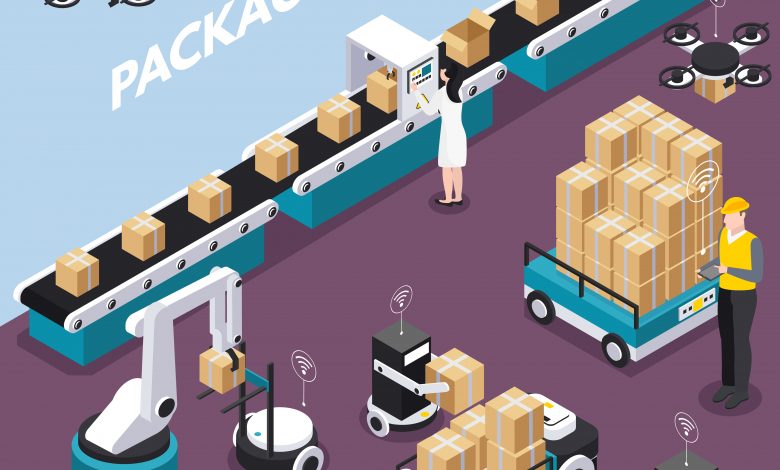The Future of Packing Machines: Predictions and Innovations

In recent years, packing machines have become integral to the global packaging industry, revolutionizing the way products are efficiently and precisely packaged. The continuous growth in demand for well-packaged products has driven manufacturers to embrace technological advancements and explore innovative solutions for packaging machines. This blog delves into the future of packing machines, focusing on key predictions and innovations for specific machines such as salt packing machine, snacks packing machine, blister packing machine, chocolate packing machine, and their relevance in the context of Bangladesh. With the advancement of technology and the increasing market demands, these machines are poised to transform the packaging landscape in the coming years.
Automation and AI Integration
The packaging industry has witnessed significant progress with the adoption of automation, and in the future, this trend is expected to accelerate. Packing machines, including those for salt, snacks, and chocolate, will increasingly integrate artificial intelligence (AI) to enhance accuracy, adaptability, and production speed.
AI-powered systems can analyze vast amounts of data, optimize packaging processes, and make real-time adjustments based on factors such as product weight, size, and packaging material. This level of intelligence ensures consistent and precise packaging, reducing the risk of errors and wastage. Moreover, AI-driven predictive maintenance can prevent downtime by identifying potential issues and scheduling maintenance proactively.
In Bangladesh, the integration of AI in packing machines will have a significant impact on the manufacturing sector, improving efficiency and reducing production costs. As the country continues to embrace technology-driven solutions, industries will benefit from increased productivity and competitiveness in the global market.
Sustainability and Eco-Friendly Packaging
The growing awareness of environmental concerns has led to a worldwide shift towards sustainability and eco-friendly practices. Consumers are becoming increasingly conscious of the impact of packaging waste on the environment, prompting companies to adopt eco-friendly solutions.
In response to this demand, packing machine manufacturers will focus on developing equipment that promotes recyclability and reduces waste. Sustainable packaging materials, such as biodegradable films and compostable plastics, will become more prevalent in the packaging industry. Additionally, efforts will be made to minimize the use of single-use plastics in packaging.
In Bangladesh, where environmental consciousness is on the rise, packing machines for snacks, chips, and chocolate will be designed to align with sustainable packaging principles. This shift towards eco-friendly packaging will not only meet consumer demands but also contribute to the country’s environmental conservation efforts.
Flexibility and Customization
In an increasingly competitive market, personalization and customization have become essential strategies for many brands. As a result, packing machines will need to offer greater flexibility to accommodate various product sizes and packaging formats.
In the future, packing machines will be designed with modular components and adjustable settings, allowing quick changeovers between different packaging formats. This adaptability will enable manufacturers to cater to a diverse range of products and packaging requirements, ensuring that they stay ahead of the competition.
In Bangladesh, as the market diversifies, the demand for packaging machines capable of handling different package sizes, shapes, and materials will rise. Whether it’s a blister packing machine for pharmaceuticals, a snacks packing machine for various snack items, or a chocolate packing machine for different product configurations, flexibility will be a key requirement to meet the changing consumer preferences in the region.
Internet of Things (IoT) Integration
The Internet of Things (IoT) is set to revolutionize the packing machine industry by enabling real-time monitoring and predictive maintenance. IoT integration will empower packing machines to collect and transmit data, allowing manufacturers to remotely monitor production, detect issues, and schedule maintenance proactively.
IoT-enabled packing machines will provide valuable insights into machine performance, production trends, and operational efficiency. Manufacturers can leverage this data to optimize production, reduce energy consumption, and make informed decisions regarding maintenance and resource allocation.
In Bangladesh, where remote management of manufacturing facilities can be a game-changer, IoT integration in packing machines will optimize production and minimize downtime. This technology will enhance efficiency and reduce operational costs, benefiting local industries significantly.
Improved Human-Machine Interface (HMI)
As packing machines become more sophisticated, the need for intuitive and user-friendly human-machine interface (HMI) will become paramount. Advanced HMIs will simplify machine operation, troubleshooting, and maintenance processes, empowering operators to work efficiently.
With improved HMIs, operators will be able to control and monitor packing machines with ease, reducing the learning curve and enhancing productivity. Visual indicators, touch-screen displays, and interactive interfaces will make the operation of packing machines more intuitive and user-friendly.
In Bangladesh, where skilled labor may sometimes be limited, user-friendly HMIs will make packing machines more accessible to operators of varying skill levels, further contributing to increased productivity and reduced error rates.
Conclusion
The future of packing machines is full of promise, driven by innovative technologies like AI integration, sustainability efforts, flexibility, IoT connectivity, and improved HMIs. As the packaging industry adapts to the evolving market demands, packing machines for salt, snacks, chips, and chocolate will play a pivotal role in streamlining packaging processes and meeting consumer expectations.
In Bangladesh, the convergence of technological advancements and sustainability practices will shape the country’s packaging industry and contribute to its economic growth. As manufacturers embrace cutting-edge solutions, the packaging landscape will undergo a transformative change, bringing forth a future where efficiency, sustainability, and technology intertwine seamlessly. The journey towards a more efficient, eco-friendly, and technologically advanced packing industry is well underway, and these predictions only hint at the transformative changes yet to come.

